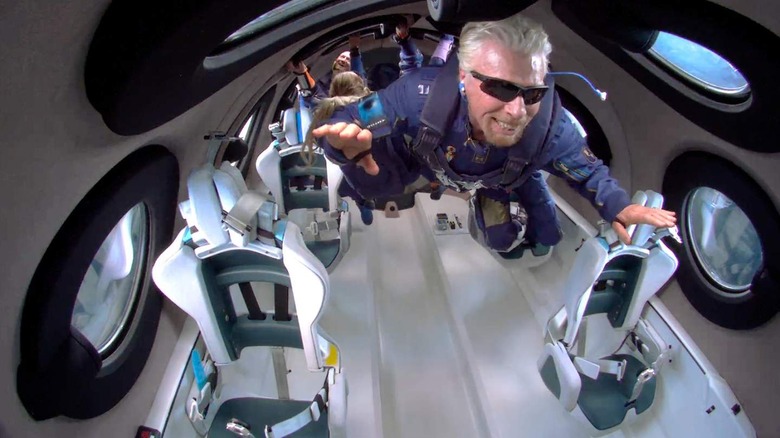Tougher FAA Astronaut Wings Rules Could Leave Bezos & Branson In Limbo
How high do you need to fly in order to officially qualify as an astronaut? That's an answer the US FAA has just weighed in on and, while the definition of where space begins may still be controversial, what it takes to get the coveted Astronaut Wings is now tougher – and could have big implications for billionaire space-fans like Jeff Bezos and Richard Branson.
The limits of just where space actually begins is a tricky topic, with no single definition. Many take the Kármán Line – the 62 mile (330,000 feet) boundary above the planet's mean sea level – as being the official point, though the US Federal Aviation Administration (FAA) is actually a little more generous there.
According to the new FAA Commercial Space Astronaut Wings Program Order 8800.2 – effective on July 20, which happened to be the day of Blue Origin's big launch with Jeff Bezos onboard – to be considered "space" the flight has to go beyond 50 statute miles above the surface of the Earth. Those onboard need to be "flight crew on an FAA/AST licensed or permitted launch or reentry vehicle," the agency adds, and "meet the requirements for flight crew qualifications and training under Title 14 of the Code of Federal Regulations (14 CFR) part 460."
There's also a third criteria, however, which those crewmembers onboard must satisfy. According to the FAA, they need to have "demonstrated activities during flight that were essential to public safety, or contributed to human space flight safety."

Figuring out exactly what qualifies under those rules appears to have been left intentionally vague, giving the FAA some wriggle-room in how it decides who gets their wings and who doesn't. While both the Virgin Galactic and Blue Origin flights went above the FAA's 50 mile mark, the FAA will have to decide whether or not they demonstrated any activity that was essential to public safety or human space flight safety.
Ironically, though Blue Origin and Jeff Bezos flew higher than Virgin Galactic and Richard Branson did, their argument may actually be weaker. New Shepard's flight was all controlled autonomously, rather than by a pilot onboard the spacecraft, effectively meaning Bezos and the others onboard – including Wally Funk and an 18-year-old last-minute substitution – were certainly passengers rather than what we might think of as crew.
To be clear, there's no advantage to being granted a set of FAA Astronaut Wings beyond the inherent kudos. You don't get a star named after you, or unlimited free wings at the fried chicken restaurant of your choice. Nonetheless, it's not hard to imagine that joining the illustrious – and relatively short – list of official astronauts would be at least part of the draw for those coughing up hundreds of thousands of dollars (or more) for a ticket onboard a Blue Origin or Virgin Atlantic spacecraft.
There's some room for negotiation, nonetheless. The FAA has a loophole for honorary awards, for "individuals whose contribution to commercial human space flight merits special recognition." If the Associate Administrator for Commercial Space Transportation (AST-1) at the agency decides someone has "demonstrated extraordinary contribution or beneficial service to the commercial human space flight industry" then they can be granted a set of Astronaut Wings, even if they don't meet all the other official criteria. Whether the FAA will make use of that for this month's twin launches remains to be seen: it could decide both Bezos and Branson deserve the plaudit based on their overall contributions to commercial space flight, though not being able to guarantee the same thing to future paying passengers could dampen the sales pitch.
The FAA is upfront about its goal with the program, and the changes it makes. "In order to maintain the prestige of Commercial Space Astronaut Wings," the agency adds, "the FAA may further refine the eligibility requirements at any time as it deems appropriate." In short, just because you can afford a ticket on a space tourism flight, don't assume you will automatically qualify as an astronaut.
